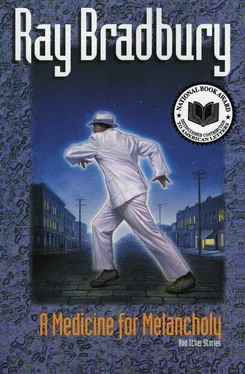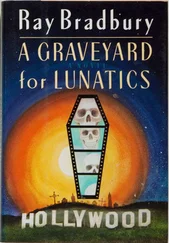The artist stopped.
George Smith drew back and stood away.
The artist glanced up, surprised to find someone so near. Then he simply stood there, looking from George Smith to his own creations flung like idle footprints down the way. He smiled at last and shrugged as if to say, Look what I’ve done; see what a child? You will forgive me, won’t you? One day or another we are all fools … You too, perhaps? So allow an old fool this, eh? Good! Good!
But George Smith could only look at the little man with the sun-dark skin and the clear sharp eyes and say the man’s name once, in a whisper, to himself.
They stood thus for perhaps another five seconds. George Smith staring at the sand-frieze, and the artist watching George Smith with amused curiosity. George Smith opened his mouth, closed it, put out his hand, took it back. He stepped toward the pictures, stepped away. Then he moved along the line of figures, like a man viewing a precious series of marbles cast up from some ancient ruin on the shore. His eyes did not blink, his hand wanted to touch but did not dare to touch. He wanted to run but did not run.
He looked suddenly at the hotel. Run, yes! Run! What? Grab a shovel, dig, excavate, save a chunk of this all-too-crumbling sand? Find a repairman, race him back here with plaster of Paris to cast a mold of some small fragile part of these? No, no. Silly, silly. Or …? His eyes flicked to his hotel window. The camera! Run, get it, get back, and hurry along the shore, clicking, changing film, clicking, until…
George Smith whirled to face the sun. It burned faintly on his face; his eyes were two small fires from it. The sun was half underwater, and as he watched it sank the rest of the way in a matter of seconds.
The artist had drawn nearer and now was gazing into George Smith’s face with great friendliness, as if he were guessing every thought. Now he was nodding his head in a little bow. Now the ice cream stick had fallen casually from his fingers. Now he was saying good night, good night. Now he was gone, walking back down the beach toward the south.
George Smith stood looking after him. After a full minute he did the only thing he could possibly do. He started at the beginning of the fantastic frieze of satyrs and fauns and wine-dipped maidens and prancing unicorns and piping youths and he walked slowly along the shore. He walked a long way, looking down at the free-running bacchanal. And when he came to the end of the animals and men he turned around and started back in the other direction, just staring down as if he had lost something and did not quite know where to find it. He kept on doing this until there was no more light in the sky or on the sand to see by.
He sat down at the supper table.
“You’re late.” said his wife. “I just had to come down alone. I’m ravenous.”
“That’s all right,” he said.
“Anything interesting happen on your walk?” she asked.
“No,” he said.
“You look funny; George, you didn’t swim out too far, did you, and almost drown? I can tell by your face. You did swim out too far, didn’t you?”
“Yes,” he said.
“Well,” she said, watching him closely. “Don’t ever do that again. Now—what’ll you have?”
He picked up the menu and started to read it and stopped suddenly.
“What’s wrong?” asked his wife.
He turned his head and shut his eyes for a moment.
“Listen.”
She listened.
“I don’t hear anything,” she said.
“Don’t you?”
“No. What is it?”
“Just the tide,” he said after a while, sitting there, his eyes still shut. “Just the tide coming in.”
A Medicine for Melancholy
(or: The Sovereign Remedy Revealed!)
“Send for some leeches; bleed her,” said Doctor Gimp.
“She has no blood left!” cried Mrs. Wilkes. “Oh, Doctor, what ails our Camillia?”
“She’s not right.”
“Yes, yes?”
“She’s poorly.” The good doctor scowled.
“Go on, go on!”
“She’s a fluttering candle flame, no doubt.”
“Ah, Doctor Gimp,” protested Mr. Wilkes. “You but tell us as you go out what we told you when you came in!”
“No, more! Give her these pills at dawn, high noon, and sunset. A sovereign remedy!”
“Damn, she’s stuffed with sovereign remedies now!”
“Tut-tut! That’s a shilling as I pass downstairs, sir.”
“Go down and send the Devil up!” Mr. Wilkes shoved a coin in the good doctor’s hand.
Whereupon the physician, wheezing, taking snuff, sneezing, stamped down into the swarming streets of London on a sloppy morn in the spring of 1762.
Mr. and Mrs. Wilkes turned to the bed where their sweet Camillia lay pale, thin, yes, but far from unlovely, with large wet lilac eyes, her hair a creek of gold upon her pillow.
“Oh,” she almost wept. “What’s to become of me? Since the start of spring, three weeks, I’ve been a ghost in my mirror; I frighten me. To think I’ll die without seeing my twentieth birthday.”
“Child,” said the mother. “Where do you hurt?”
“My arms. My legs. My bosom. My head. How many doctors—six?—have turned me like a beef on a spit. No more. Please, let me pass away untouched.”
“What a ghastly, what a mysterious illness,” said the mother. “Oh, do something, Mr. Wilkes!”
“What?” asked Mr. Wilkes angrily. “She won’t have the physician, the apothecary, or the priest!—and Amen to that!—they’ve wrung me dry! Shall I run in the street then and bring the Dustman up?”
“Yes,” said a voice.
“What!” All three turned to stare.
They had quite forgotten her younger brother, Jamie, who stood picking his teeth at a far window, gazing serenely down into the drizzle and the loud rumbling of the town.
“Four hundred years ago,” he said serenely, “it was tried, it worked. Don’t bring the Dustman up, no, no. But let us hoist Camillia, cot and all, maneuver her downstairs, and set her up outside our door.”
“Why? What for?”
“In a single hour”—Jamie’s eyes jumped, counting—“a thousand folk rush by our gate. In one day, twenty thousand people run, hobble, or ride by. Each might eye my swooning sister, each count her teeth, pull her ear lobes, and all, all, mind you, would have a sovereign remedy to offer! One of them would just have to be right!”
“Ah,” said Mr. Wilkes, stunned.
“Father!” said Jamie breathlessly. “Have you ever known one single man who didn’t think he personally wrote Materia Medica? This green ointment for sour throat, that ox-salve for miasma or bloat? Right now, ten thousand self-appointed apothecaries sneak off down there, their wisdom lost to us!”
“Jamie boy, you’re incredible!”
“Cease!” said Mrs. Wilkes. “No daughter of mine will be put on display in this or any street—”
“Fie, woman!” said Mr. Wilkes. “Camillia melts like snow and you hesitate to move her from this hot room? Come, Jamie, lift the bed!”
“Camillia?” Mrs. Wilkes turned to her daughter.
“I may as well die in the open,” said Camillia, “where a cool breeze might stir my locks as I …”
“Bosh!” said the father. “You’ll not die. Jamie, heave! Ha! There! Out of the way, wife! Up, boy, higher! ”
“Oh,” cried Camillia faintly.“ I fly, I fly …!”
Quite suddenly a blue sky opened over London. The population, surprised by the weather, hurried out into the streets, panicking for something to see, to do, to buy. Blind men sang, dogs jigged, clowns shuffled and tumbled, children chalked games and threw balls as if it were carnival time.
Down into all this, tottering, their veins bursting from their brows, Jamie and Mr. Wilkes carried Camillia like a lady Pope sailing high in her sedan-chair cot, eyes clenched shut, praying.
Читать дальше












